
Descripción: Curso IBM System z Parallel Sysplex Operations
Formación en System Programmers
This course is designed so that students can learn how z/OS systems operate in a Parallel Sysplex environment through discussion topics and hands-on lab exercises. Students learn problem determination skills, practice enhanced sysplex operations, including management of the coupling facility (CF), and use recovery capabilities provided by the System z servers.
\n\nThe course consists of six units and 12 hands-on lab exercises.
Formación IBM
Parallel SysplexDetalles
Contáctenos a través de >éste formulario<
Precios especiales para la formación de grupos
Podemos adaptar cualquier curso a sus necesidades, e impartirlo en sus instalaciones o en nuestros centro de formación ContáctenosCursos relacionados


